The four players who have scored in a Clásico for both Real Madrid and Barcelona
A number of players have defended the colours of both clubs, but only four have managed to score for both in the biggest game in Spanish football.
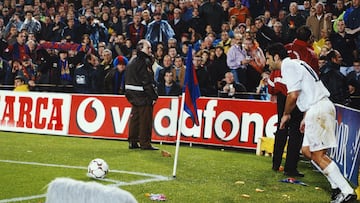
You won’t find many players who, during their careers, have defended the colours of both Real Madrid and Barcelona - the two grandees of Spanish football and the two clubs with the fiercest rivalry. A total of 39 players have represented both sides and almost all of the most famous cases were foreign players who were not born in either the capital or the Condal City.
Luis Figo, Luis Enrique, Michael Laudrup, Samuel Eto’o and Ronaldo Nazário are arguably the most well known players to have crossed over to the dark side - in either direction. Some made the move directly - with varying degrees of controversy. Then there are the cases of players who came via other clubs, which might have been a little easier for the fans to digest: Javier Saviola, Albert Celades, Bernd Schuster, Gheorghe Hagi, Robert Prosinecki, Julen Lopetegui....
Some of them got on the scoresheet in El Clásico for either Madrid or Barça but only have scored for both: Figo, Luis Enrique, Ronaldo and Josep Samitier.
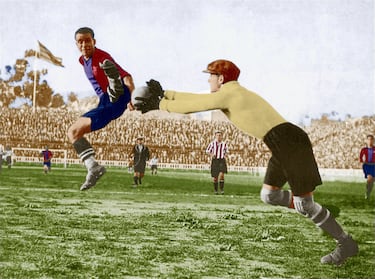
Josep Samitier
The first to do it, Josep Samitier (1902-1972), El Mago (the Wizard), remains a Barça legend, even though he enjoyed greater success in front of goal with Madrid (then known as Madrid CF) in El Clásico. Between 1919 and 1932, he was one of the blaugranas’ most iconic players and, despite being a midfielder, he was a highly proficient goal scorer. During his 17 seasons at Barça, he found the target once against the old enemy. After making the switch in 1932, he scored three times against his old club.
Barcelona hosted Madrid on the final day of the 1931-2 season. Samitier gave the locals an early lead but the visitors responded and it ended 2-2 on the whistle - enough for Los Blancos to be crowned champions.
Samitier became the first player to score for and against both clubs in the Week 15 league meeting in Chamartin in March 1933. He was on target twice, either side of half-time; Severiano Goiburu pulled one back for the visitors late on as it ended 2-1.
He repeated the feat, breaking Barça hearts, the following year. Madrid raced to a 3-0 first-half lead in the capital in January 1934 with Samitier grabbing the team’s second goal. Hilario added a fourth after the break to equal Madrid’s biggest win over the Catalans.
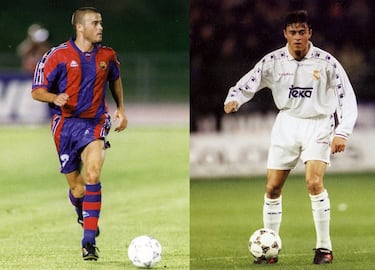
Luis Enrique
Luis Enrique was the next player to score for both. Unlike Samitier, the current PSG coach started out with Madrid, making the switch to Barcelona in the summer of 1996, after having been a first-choice with Los Blancos since his arrival from Sporting in 1991-92. His first goal in a Clásico came in his penultimate season in Madrid - in the 5-0 drubbing at the Bernabéu in January 1995.
With Barça, he bagged a brace in the 3-0 Week 22 league win in 1998-99 and celebrated against his old employers again by scoring the opener in the 2-0 home win in 2000-01, and cancelled out Ronaldo’s opener in the 1-1 in 2002-03. For madridistas, he was viewed for many years as a traitor and a symbol of barcelonismo.
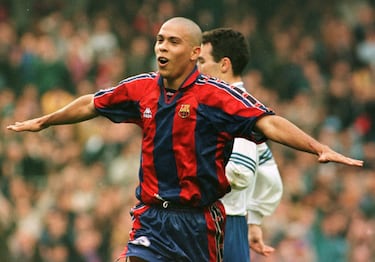
Ronaldo Nazário
Ronaldo’s case is different for several reasons - firstly because he’s Brazilian, he arrived from Inter Milan having previously spent just one season at Camp Nou and out of the two clubs, he had a more profound impact with Madrid. He spent the 1996-97 campaign at Barça, and scored the winner (and missing a penalty) in the 1-0 win at Camp Nou in Week 37. He left for Milan only to return to LaLiga in 2002 becoming the third superstar in Florentino Pérez’s Galáctico project. He would scored a total of four goals for Madrid against Barcelona in El Clásico. He found the net in successive seasons, scoring in the 1-1 draw at the Bernabéu in 2002-03; the following season he scored Madrid’s second goal in the 1-2 win at Camp Nou; in 2004-05, he joined Zidane, Michel Salgado and Michael Owen on the scoresheet as Vanderlei Luxemburgo’s team ran out 4-2 winners at the Bernabéu) and his last goal in a Clasico came in 2005-06, snuffing out Ronaldinho’s opener in the 1-1 draw at Camp Nou.
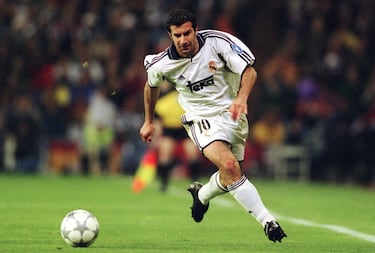
Luis Figo
Finallly Figo, whose first Clásico goal came long before Ronaldo joined the Catalans. The Portuguese winger’s move from Camp Nou to Madrd in the summer of 2000 sent shockwaves through Barcelona. Florentino splashed out a world record 10.000 million pesetas (62 million euros) to lure Figo, a Barça idol, to the capital. Like Luis Enrique but in the opposite direction, Figo was seen as a villain and money grabber for changing allegiances.
In the 1995-96 he was on target in the 3-0 win at Camp Nou, and again the following season (3-0 in 1997-98). In his final season before accepting Florentino’s offer (1999-00) he found the net in the 2-2 at Camp Nou. With Madrid, he only scored once in the Clásico - the 2-0 at the Bernabéu in November 2001. Four goals in total. Five years at both clubs but with more appearances for Barcelona (172 compared to 164 with Madrid), but Culés will never forgive him.
Related stories
Sunday’s Clásico between Real Madrid and Barcelona will kick off at 3 p.m ET 12 noon PT at the Santiago Bernabéu in Madrid. In charge of keeping the game flowing will be referee César Soto Grado in charge of overseeing his first Clásico.
Madrid go into the game top of LaLiga on 78 points, eight points ahead of Barcelona who are second. The reverse fixture at the Lluis Companys in October ended in a 1-2 win for the visitors with Jude Bellingham on target twice in the second half.
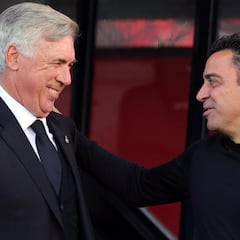
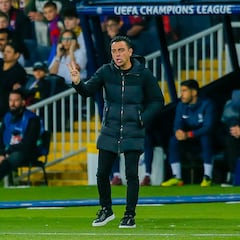
Complete your personal details to comment